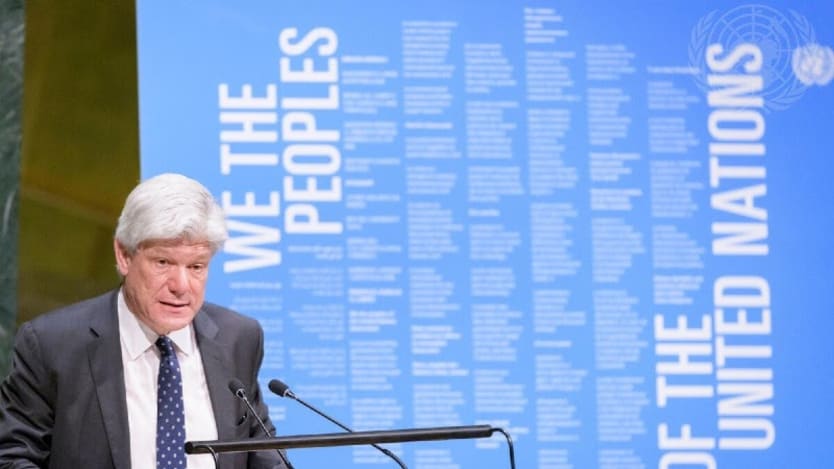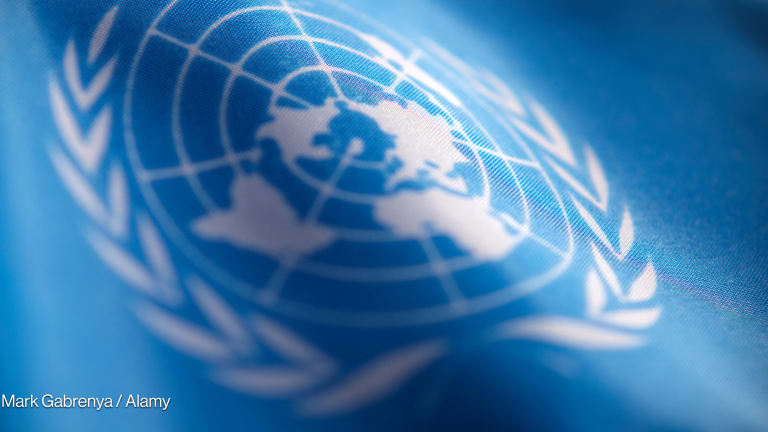
Nearly all of the 1.5 million people surveyed over the past year as part of a United Nations initiative said they believe international cooperation is important for addressing global challenges, and engagement across borders has gained more relevance during the COVID-19 pandemic. But for most respondents, the international body remains an abstract concept, removed from their everyday realities.
These are some of the new findings released by Fabrizio Hochschild, U.N. special adviser on the preparations for UN75, and his office last week. The initiative has worked over the past 12 months to provide a “reality check” on what changes the 75-year-old global institution should implement to become more relevant.
“COVID induced greater support for international cooperation. The paradox of people being more isolated, traveling less than ever ... [border] closures being more enforced than ever, [and] people being confined more than ever also induced people to be much more aware of their interdependence and interconnectivity,” Hochschild said during a media briefing in Geneva on Friday.
But that does not mean there should be “complacency” for the U.N., which is undertaking an ongoing internal reform process. Member states also pledged to act on the UN75 initiative’s findings during a meeting in September — though have yet to take concrete steps.
“For at least half of our respondents, the U.N. is seen as rather remote. ... There is clearly a need for much greater focus on outreach.”
— Fabrizio Hochschild, U.N. special adviser on the preparations for UN75“People want to see a U.N. that is more inclusive, that better reflects the stakeholders today, that reflects the diversity of power-holders today — more inclusive of youth, of civil society, of private entities, of regional organizations. They also want to see a U.N. that is more focused and delivers better and is more accountable,” Hochschild said.
The UN75 initiative enlisted the support of the Pew Research Center and Edelman Intelligence to conduct surveys of 1.5 million people in 195 countries. The U.N. also held over 3,500 conversations with hundreds of thousands of people across 100 countries, according to Hochschild, to inform the analysis of people’s hopes and fears for their future, as well as the role of international engagement.
Globally, 49% of respondents said they believed that people will be better off in 2045, as opposed to the 32% who said that people will be worse off, according to the report, “Shaping Our Future Together,” released Friday. People living in lower-income countries and those living in conflict situations expressed greater optimism about the future than people in high-income countries.
The findings also show that people are broadly united in wanting better access to “affordable, basic services,” according to Hochschild. Universal access to health care is at the top of this list, which also includes investment in education and youth, as well as access to safe water and sanitation.
Climate change is a looming fear shared by many people, in addition to violence. Beyond traditional forms of state warfare, concerns around violence extended to gender-based violence and, increasingly, political violence. Other long-term priorities vary according to income levels but include rising worry about employment opportunities and human rights.
“Paradoxically, in countries that are the poorest, hardest hit by conflict, levels of optimism about the future are the highest, and in higher-income countries, optimism is lower,” Hochschild said.
Hochschild, 57, reflected during a second press briefing in New York on growing up mostly in Europe. His parents and their generation held the expectation that their children would grow up in a world where “salaries would rise, where health care would get even better, education would get even better, and there was this steady path to constant progress.”
That hope no longer rings true for many people, including himself, Hochschild said.
There is 'enough common ground' to revitalize the UN, but it still won't be easy
Governments agreed to recommit and upgrade the U.N. during the General Assembly last year. Despite a jump in public demand for international cooperation, the pandemic and rising nationalism are two challenges, experts say.
“I have severe doubts, and I know many of my peers do, too, [about] whether my kids will have the same employment opportunities that I was offered when I left university. In many developed countries, after decades of progress, there is the sense of insecurity and fear,” Hochschild said.
U.N. chief António Guterres is expected to issue formal recommendations to member states that can guide an institutional response to this public engagement initiative. Some of the solutions, including better engagement with the public, should be easily accessible for the U.N., Hochschild said.
While 52% of respondents said that international cooperation is “essential” for addressing global challenges, 34% said it is “very important,” and 11% said it is “fairly important.” The remaining 3% said it is not important.
And while 74% of survey respondents said that the U.N. is an essential organization, just over 50% said that they see the positive impact the U.N. is having on their country or on them personally.
“While there is high respect for the U.N., there is also a perception that people are not adequately informed about the U.N. And for at least half of our respondents, the U.N. is seen as rather remote, and its impact on people’s lives is not known. There is clearly a need for much greater focus on outreach, both by the U.N. and our partners,” Hochschild said.








